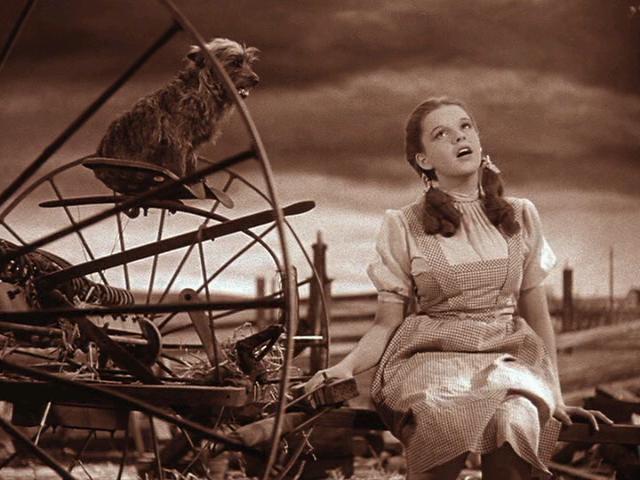by Chris Feil
Where to even begin with “Over the Rainbow”? A song that defined one of the most singular legends of the movies. One of the most significant songs in all of cinema in one of the most enduring films, a song that legend tells was almost removed. A song that turns the specific pain of one character into a universal one across generations and vastly different experiences. There is only one “Over the Rainbow” and one The Wizard of Oz, just as there was only one Judy Garland.

We know the song first as the prototypical “I want” song, the confessional ballad that reveals the young Dorothy Gale’s interior life. She grows up uninterestingly on a farm in Kansas, her life defined by dust while her heart yourns for the Technicolor late will later come when she steps into Oz. Her one solace, her dog Toto, is threatened to be taken away. It’s a simple scenario to launch her into singing about wanting a life that gives rather than takes, but remains incredibly accessible and relatable due to Garland’s vocal expressiveness mining it for all of its longing. Even if the film’s ultimate lesson is to appreciate the things you already have in tandem with what you want, the wishing well of the song is embedded deeper into the core of the film’s legacy.
Beyond the film, “Over the Rainbow” is inextricable from Judy herself, marking the evolution of Garland’s career and also her vocal instrument. As the years and injustices wore on, we could always recall the sound of the youthful Garland singing its melodies as the sound became more reflective and regretful at various stages in her career. The feelings only went deeper as her voice grew harder and harder until it broke. Dorothy’s wish for a better tomorrow was always a little sad, but each time Garland stepped up to its beloved refrain, it was a reckoning with the hardships of her past and present.
In some way, it becomes easy to graft our own endured sorrows and faded dreams onto the song as we age with it, the younger Garland representing our hope when it was at its purest. Especially embraced for its literal and subtextual meaning by the queer masses, “Over the Rainbow” has a special place for many of us whose narratives demand flight, whether for safety or spiritual necessity. Judy Garland understood that and many other personal connections her audience felt in its melody, turning performing it into a dialogue of seeing one another’s buried traumas, granting a restorative gift.
But despite all of the sorrows we can interpret Garland as rehashing from her story and ours, the song and her performances of it remain powerful because of how she allowed the hope to still shine through. Few artists are given a signature song that we experience so personally, that changes with us as we change, that put us in touch with the deepest parts of ourselves. And none of those artists did it as resolutely as she.
All Soundtracking installments can be found here!